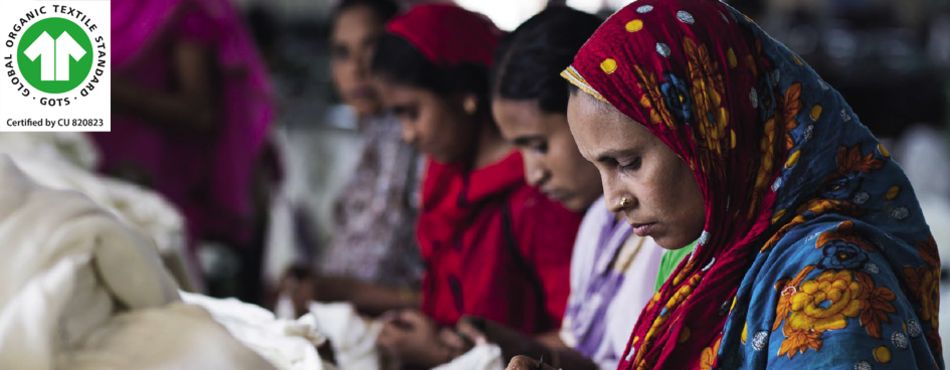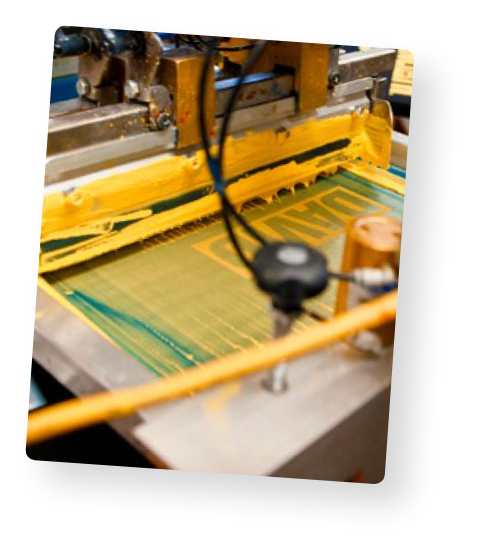Fair & Organic

At this point we would like to introduce companies that are particularly concerned about fair trade and environmentally friendly production. We are one of the few textile printers in Europe to offer GOTS-certified printing on textiles.
Organic Cotton
This is characterized by the use of genetically unmodified plants and the absence of artificial chemicals and fertilizers.
This type of management is now practiced in over 24 countries, and global production is showing annual growth rates of over 50%. The advantages of cultivating “organic cotton” are manifold:
- Protection of the quality of ground and surface water
- ecological diversity is preserved
- no impairment of end consumers by dangerous residues
- the soils are less prone to erosion
Seals for compliance with certain environmental standards are, for example, GOTS (Global Organic Textile Standard) and Ökotex, more information about the certificates.
social standards and fair production
The seals for organic cotton almost always contain standards regarding the social acceptability of trading in cotton, cotton products and their processing. In the same way, special certificates for fair trade and fair production do not ignore certain environmental standards. Fair and organic go hand in hand and cannot be separated.
More than 100 million households worldwide are involved in cotton production. The poor working conditions in India, Bangladesh, Pakistan and other countries are well known. However, various organizations and producers have made it their task to also strengthen the weaker links in the production chain. The Fair Wear Foundation (FWF for short) is one of the most important institutions in the clothing sector. The foundation checks whether the actors united under it implement the strict guidelines. The Code can be broadly broken down into the following 8 points:
- Working hours must comply with applicable industry standards. This means that workers should generally not work more than 48 hours per week and have at least one day off per week (ILO Convention 1).
- No forced labor. Employment must be voluntary
- No Child labor. This means no work before the end of compulsory schooling and never under the age of 15 (ILO Convention 138).
- The remuneration must at least correspond to the legal or industry-specific minimum standards and must meet the basic needs of the employees and their families (ILO Conventions 26 and 131).
- Workers are allowed to organize in unions and engage in collective bargaining (ILO Conventions 87 and 98).
- The working conditions must comply with applicable hygiene and safety regulations. For example, workers must not be exposed to toxic chemicals (ILO Convention 155).
- the employment relationship must be concluded by means of a legally binding employment contract.
- All workers have equal rights, regardless of skin color, gender, religion, political opinions, union membership, nationality, social background and physical or mental handicaps (ILO Conventions 100 and 111).
Why pay attention to fair and ecological production when it comes to clothing?
cotton in general
Cotton is a crop that is mainly grown in subtropical countries such as Turkey, Pakistan and India, but also in the USA.
Cotton has a long growing season, which is why catch crops are generally avoided for reasons of profitability. This reduces the quality of the soil, and weeds that are prevented from thriving by changing crop rotation cause additional damage to the soil.
Due to the disadvantages, the cultivation of cotton has the reputation of being ecologically particularly incompatible. A rethink has been taking place since the early 1990s. More and more producers are switching to environmentally friendly production.
Disadvantages of conventional cotton cultivation
In conventional cultivation, high cotton yields are only possible with the heavy use of chemicals. A few facts about this:
- 2.5% of the world’s agricultural land is used for cotton. However, 16% of all pesticides used worldwide are used for this (including herbicides, insecticides and defoliants).
- the chemicals processed pollute the air and surface water
- Residues in the end products can cause skin irritation and allergies in consumers
- biodiversity is shrinking and the ecological balance is shifting
New: Black Star is PETA Approved Vegan certified:
Certificates and GOTS Certification:
Stanley/Stella
Stanley and Stella was founded with the belief that the textile industry needs to start acting more responsibly. From the very beginning, the company relied on fashionable cuts and consistently fair and sustainable production.
Fair:
The workers responsible for making the garments are treated fairly and paid fairly. This is guaranteed by Stanley & Stella’s membership in the FairWear Foundation.
Consistent:
Stanley & Stella works exclusively with environmentally friendly materials such as certified organic cotton, organic cotton mixed with Tencel or Modal, linen or recycled polyester (from PET bottles). Almost all of the items made from organic cotton are certified according to the recognized GOTS standard.
Other certifications: OCS 100, OCS Blended, OEKO-TEX, REACH



